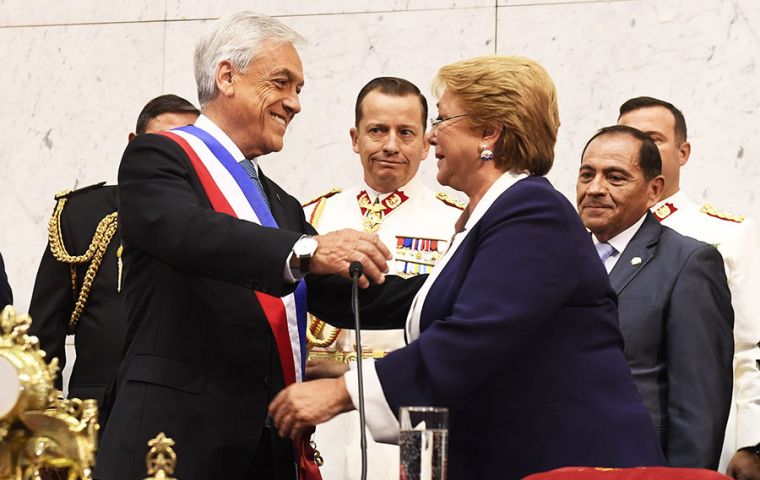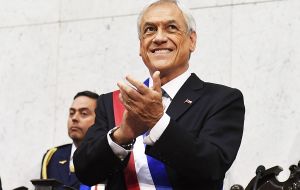MercoPress. South Atlantic News Agency
A more humble mature Piñera promises Chile growth and jobs
 An emotional Bachelet helped Piñera put on the sash of office, gave him a kiss and then left the Congress with members of her government. (Pics Chile gov)
An emotional Bachelet helped Piñera put on the sash of office, gave him a kiss and then left the Congress with members of her government. (Pics Chile gov)  Bachelet was cheered by supporters as she capped a second term in office in which she saw through an ambitious package of reforms
Bachelet was cheered by supporters as she capped a second term in office in which she saw through an ambitious package of reforms  Piñera said he had ”more experience, maturity, awareness of uniting Chileans; greater humility to listen with eyes and ears that are more attentive”
Piñera said he had ”more experience, maturity, awareness of uniting Chileans; greater humility to listen with eyes and ears that are more attentive” Conservative billionaire Sebastian Piñera was sworn in Sunday to his second term as president of Chile, replacing socialist Michelle Bachelet in the office for the second time in eight years. An emotional Bachelet helped Piñera put on the sash of office, gave him a kiss and then left the Congress with members of her government.
Piñera, who was president from 2010-2014, has promised to stimulate growth and create jobs. He is assuming the presidency just as Chile’s economy is showing signs of rebounding from a period of sluggish growth due to low prices for copper, the country’s biggest export.
“The good times are coming,” his supporters chanted after he was sworn in.
Bachelet was cheered by supporters as she capped a second term in office in which she saw through an ambitious package of reforms aimed at eliminating the institutional legacy of the 1973-1990 dictatorship of Augusto Pinochet.
In a Facebook message, she said she was “profoundly proud of the transformation that we pushed these years” and said she was convinced Chile today is more “just, equitable and free.” She was Latin America’s last sitting chief of state who is a woman.
Implementing the changes she made will now be up to the 68-year-old Piñera, who says he wants to reform the Pinochet-era pension system and supports the free education system instituted by Bachelet.
“I feel I now have more experience, more maturity, more awareness of the importance of uniting Chileans; greater humility to listen, with eyes and ears that are more attentive,” he said this week.
Piñera — whose fortune has been estimated by Forbes at US$ 2.7 billion — has promised to transform Chile into a developed economy in eight years. During his first term, 2010/2014, Piñera oversaw growth that averaged 5.3% a year aided by pro-business policies, rising prices for Chile’s chief export, copper, and a massive rebuilding effort following a magnitude 8.8 earthquake that hit just before he took office.
A slump in copper prices helped sour Bachelet’s second round as president, with the economy — and the president’s popularity — slipping badly in 2014 and 2015. The country’s first female president had been wildly popular when she ended her initial term by handing power to Piñera.
“From day one, Piñera is going to want to show that under him, the wheels of the economy will start to spin again,” said Cristobal Bellolio, a professor of government at the Adolfo Ibañez University.
His first administration was marked by massive street demonstrations to demand reforms to education and other services, as well as by the start of softening copper prices, and he left office with ratings in the 30s.
Piñera, whose first term ended 20 years of left-leaning governments, has said he hopes to work with centre-left rivals to achieve his goals, but he also faces a challenge of herding his own sometimes fractious coalition, which includes parties that backed the dictatorship of General Augusto Pinochet from 1973 to 1990.
“We have to see effectively if the right, for the first time in history, has the capacity to work as a team,” said political analyst Miguel Zlosilo.




Top Comments
Disclaimer & comment rules-

-

Read all commentsAn example of democracy! NOT like what happened in Argentina when Her Ladyship refused to pass over the the batton and other elements of office to the then elect president Mauricio Macri.
Mar 12th, 2018 - 11:18 am 0All the very best to our Chilean friends. The most civilised and friendly South American nation and a great place to visit.
Mar 12th, 2018 - 01:57 pm 0Commenting for this story is now closed.
If you have a Facebook account, become a fan and comment on our Facebook Page!